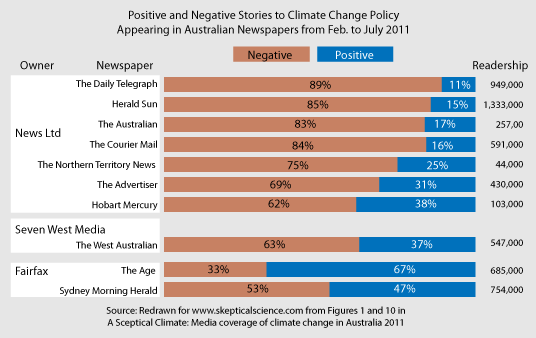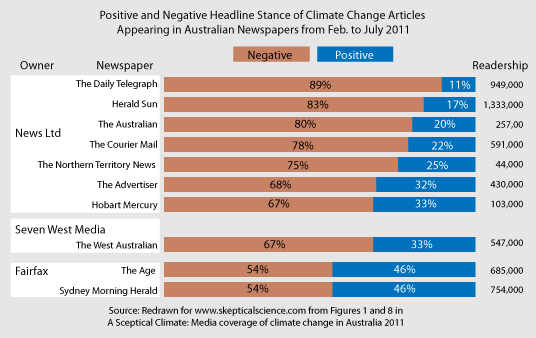
Accurate and unbiased communication of information is essential when coming to an informed decision on any subject; and there is arguably no more compelling a subject than anthropogenic global climate change. Skeptical Science prides itself on being a website fully committed to communicating the science.
Pure climate science is complex, so it doesn’t take much misinformation to corrupt the communication process. When this is coupled with the remaining uncertainties inherent in the science, it is all-too-easy for the vocal “skeptic” view to confuse the public and the policy-making politicians.
Skeptical Science is playing an increasing role in disseminating the science and countering the misinformation, but the role of informing the less-engaged broader public still, and probably always will, remain with the mass media at the local, national and international level. This heavy responsibility is shouldered by small media outlets through to multinational media corporations.
The problem is once misinformation, in the form of myths, is accepted as fact it becomes very hard to dislodge them from people’s general beliefs about the world, even when it can be clearly shown these specific beliefs are wrong. John Cook explains and demonstrates this in a recent presentation to the American Geophysical Union. A more detailed explanation of this phenomenon is given here. The media has played a major role in embedding these myths.
So what message should the mass media be communicating about climate change science?
The unambiguous message coming from the science is that to avoid dangerous levels of atmospheric carbon dioxide, all countries must put in place effective mechanisms, such as putting a price on carbon, to achieve a reduction in greenhouse gas emissions.
Paradoxically, the most recent studies show there is an acceleration, not decrease, in emissions; so the current message is falling mainly on deaf ears.
Australia is the latest country to legislate such a mechanism, but this will have to be progressively strengthened to achieve the reduction goal. This tells the torturous and long path to enact the Australian legislation. During this period Australia’s mainstream media was hyperactive in the climate change debate.
A snapshot of Australia’s print media’s role is contained in a just-released study, which compiled data on the published material on climate change policy response from ten newspapers located in Australia’s capital cities.
A vigorous methodology was used, which included; Topic (Climate policy); Genre (Feature, News, Short Feature, Letters); Types and identity of sources quoted; A breakdown of business sources into different industries, and many other codings (refer to study).
The study’s key findings on published articles (carbon pricing policy) were:

The article’s headlines were more unbalanced than the actual content of articles.

(Note: News Ltd. controls around 70% of Australia’s print media.)
There has been no equivalent studies done covering the radio and television media but from observing their output on climate change policy a similar result could be extrapolated.
The study’s results may come as a surprise to some because the Australian (News Ltd. flagship) has repeated stated in climate change editorials that, in respect to greenhouse warming, we must give the planet “the benefit of the doubt”. This editorial policy is not reflected in the study.
It is almost unanimously agreed that global temperatures over the past hundred years have risen (the diehards still say otherwise). The science shows this has been almost entirely caused by greenhouse gas emissions, and to a lesser degree by related land-use practices that result in deforestation and desertification.
Human activity has become a global force in nature.
One of the consequences of a warming planet is heat related extreme weather events, both in frequency and intensity. This is pretty basic physics so you don’t have to be a climate scientist of understand the principle involved.
The media report these weather events and their flow-on effects, so in the future there will be a corresponding increase in vision footage, printed words and verbal broadcast material.
One of the beneficiaries of global warming will be the media - but it will be a sorrowful tale to tell.
Posted by Brian Purdue on Wednesday, 21 December, 2011
 |
The Skeptical Science website by Skeptical Science is licensed under a Creative Commons Attribution 3.0 Unported License. |